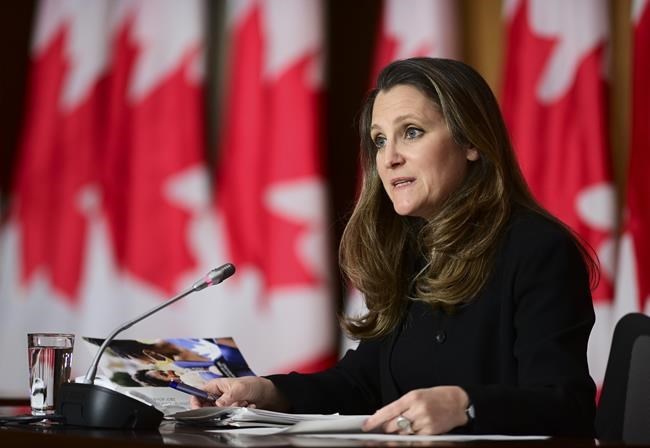VENICE, Italy — Canada stands firmly behind a two-pillar plan to enact sweeping reforms to the global corporate tax system and limit multinational companies' capacity to shop around for lower tax rates, the country's finance minister said Saturday.
Chrystia Freeland and her counterparts in the rest of the Group of 20 countries, which represent the bulk of the world's economic activity, formally endorsed the proposed reforms at a meeting in Venice, Italy.
Freeland said the first pillar of the plan includes allocating taxing rights to market jurisdictions where the world's largest multinational corporations do business, regardless of whether they have a physical presence there, she said.
The second prong involves a 15-per-cent global minimum corporate levy to deter big companies from making use of low-rate tax havens, a scheme that has cost governments across the world billions of dollars.
"This is really bringing the global tax system in line with the realities of the global economy of the 21st century," Freeland said in a Saturday teleconference. "This is an opportunity for us to act together to end tax arbitrage, to end jurisdiction shopping by multinationals."
A global corporate minimum tax rate is now supported by 132 countries, she said.
The Paris-based Organization for Economic Cooperation and Development is set to hash out more key details of the proposal before G20 leaders make a final decision at their meeting on Oct. 30-31 in Rome.
Freeland said the deal could "end the race to the bottom in corporate taxation around the world and ensure that all multinational corporations pay their fair share of taxes, regardless of where they do business, or (where) their headquarters are located."
It may also level the playing field for Canadian companies by ending jurisdiction shopping, ensuring that the country's workforce and social safety net are globally competitive, she added.
The international tax proposal aims to deter the world's biggest firms from using accounting and legal schemes to shift their profits to countries where little or no tax is due — and where the company may do little or no actual business.
Under the proposed minimum rate, companies that escape taxes abroad would pay them at home, ostensibly eliminating incentives for using or establishing tax havens.
A second part of the plan would permit countries to tax a portion of the profits of companies that earn profits without a physical presence, such as through online retailing or digital advertising.
That pillar took shape after France, followed by other countries, imposed a digital service tax on U.S. tech giants such as Amazon and Google. The U.S. government regards those national taxes as unfair trade practices and is holding out the threat of retaliation against those countries' imports into the U.S. through higher import taxes.
The terms of the proposed deal would see those countries drop or refrain from national taxes in favour of a single global approach, in theory ending the trade disputes with the U.S. U.S. tech companies would then face only the one tax regime, instead of a multitude of different national digital taxes.
If the deal is approved, implementation may begin as soon as 2023 but would depend on action at the national level.
The draft proposal was approved July 1 in talks among more than 130 countries convened by the OECD.
This report by The Canadian Press was first published July 10, 2021.
- - -
This story was produced with the financial assistance of the Facebook and Canadian Press News Fellowship.
The Canadian Press



